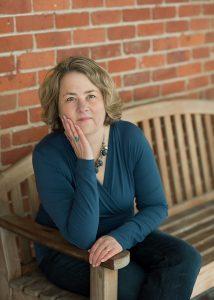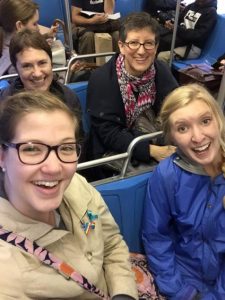In unarguably America’s most historic city, Dr. Natalie Dykstra is currently flinging open archival doors, often quite literally, for the scholarship and imaginations of Midwest faculty and students.

Each June in Boston – with its wealth of recorded narratives and artifacts from the past, Dykstra – with her trademark affinity for American history and literature – welcomes researchers from Great Lakes Colleges Association (GLCA) schools to step foot into history by working in notable archives that house a myriad of interdisciplinary stories. Once in them, participants in the GLCA Boston Summer Seminar (BSS) find that centuries-worth of artifacts and articles impact their independent thinking and learning. It’s become a win-win-win situation for all involved.
“In Boston, the GLCA faculty members win because they get to concentrate on their own work,” says Dykstra. “Students win because they get to live in this great city and do original research. And the archives we work with win, too, because they want to be part of it. They want to have their materials looked at and used.”
Dykstra, professor English, created the now-competitive and popular GLCA Boston Summer Seminar just two summers ago. Teaching at Hope in the fall and living with her husband in Waltham, Massachusetts, the remainder of the year, she wanted to expose Midwest faculty and students to the Boston institutions that changed her life when she researched and wrote her critically-acclaimed book, Clover Adams: A Gilded and Heartbreaking Life, a once hidden story about a fiercely intelligent and creative Boston Brahmin. “I found working in the archives to uncover Clover’s life and death to be moving and gripping… And I wanted others to have that same experience, that same feeling, too,” she confides.
After all, Dykstra’s dream was to make archive work the heartbeat of the GLCA Boston Summer Seminar experience, making available tactile materials – diaries, ledgers, photos, letters, newspaper clippings – that make history come alive.
Helping others to use archival materials to unfold other remarkable stories would require partnering with Boston research institutions that house unique primary source materials. After all, Dykstra’s dream was to make archive work the heartbeat of the GLCA Boston Summer Seminar experience, making available for students tactile materials – diaries, ledgers, photos, letters, newspaper clippings – that make history come alive. So, with the Massachusetts Historical Society (MHS) as host, she and Hope alum and MHS reference librarian Anna Clutterbuck-Cook ’05 arrange a network of connections with the Northeastern University Archives & Special Collections, and three archives at Harvard University: the Countway Center for the History of Medicine, the Schlesinger Library and Houghton Library.
“You don’t create a program like this by yourself,” confesses Dykstra. “If the Boston Summer Seminar was my idea, Anna and her expertise has been absolutely crucial in getting it off the ground and making it a success. All our partner archivists are necessary for our success, and a pure pleasure to work with…. Plus, they have asked me, ‘Where do you get your students? We are so impressed.’ It’s a joy and a privilege to hear them say that.” Dykstra is also grateful to the strong support for the seminar from Greg Wegner at the GLCA and from her college colleagues.
Once participants are selected – three teams consisting of a faculty member and two students, from numerous applications each year – Dykstra and Clutterbuck-Cook connect GLCA faculty and students to the right archivist according to their interests. This year, teams from Albion College, Denison University, and Oberlin College are delving into topics on the experience of black Northerners in the era of Southern Emancipation, Boston and New England in Atlantic contexts, and occult practices and new literary traditions in 19th century America, respectively.

Last June, though, the Hope team of Dr. Julia Randel, associate professor of music and chair of the department, and then students Hannah Jacobsma and Genevieve Janvrin, now graduates, were selected to go to Boston – receiving faculty funding and student stipends (as all participants do) – to conduct research on three separate, though related, projects: Romanticism in 19th-century French ballet (Jacobsma); the tours by Diaghilev’s Ballets Russes that brought serious ballet to the United States in 1916-17 (Janvrin); and George Balanchine’s work with Igor Stravinsky (Randel). Randel’s research in Boston informs a book she is writing about the composer and choreographer.
“Natalie’s work for us was so wonderful,” declares Randel, who earned her doctorate from Harvard and specializes in the history of European and American classical music. “We had so much support there. And for me, going to Boston was like going home, and I hadn’t been back for a while. It was like a dream come true to receive funding to be in a place I love.”
Besides the transformative experience of archive work, faculty and students are exposed to weekly guest speakers, such as Pulitzer Prize winner Megan Marshall, receive historical tours, and are hosted at Dykstra’s Waltham home. Each activity and project gives participants both a breadth and depth of experience as well as clarity of purpose, gleaned from the past and applied to the present and future.
“I got carried away with the stories and the questions,” wrote Janvrin in a BSS blog entry about her experience. “I got carried away with the quiet Houghton atmosphere and the kind souls, both living and dead, who guided me. I got carried away with Boston. My time at MHS, Houghton, and Harvard helped formulate a desire for the future: I want to be a researcher.”

